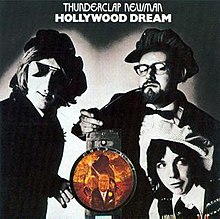Hollywood Dream is the only studio album by British rock band Thunderclap Newman.
| Hollywood Dream | |
|---|---|
 | |
| Studio album by | |
| Released | September 1970[1] |
| Recorded | 1969 |
| Genre | Rock |
| Length | 47:41 |
| Label | Track |
| Producer | Pete Townshend |
| Singles from Hollywood Dream | |
| |
| Review scores | |
|---|---|
| Source | Rating |
| AllMusic | |
| Christgau's Record Guide | B−[3] |
| Classic Rock | |
| Music-News | |
Overview
editThe album was produced by The Who's guitarist and songwriter Pete Townshend, who was also responsible for the band's initial formation.[6] Townshend helped the group to obtain a recording contract with Track Records, a company formed by Kit Lambert and Chris Stamp, who were managers of The Who. Townshend also played bass on the album, credited under the pseudonym "Bijou Drains", although the later CD releases do not credit him.[6][7] Track Records licensed the recordings to Atlantic Records for initial release in the U.S.
The group's first single, "Something in the Air", was a UK number 1 hit and is the song for which Thunderclap Newman are best known.[8][9] The single also reached #37 on the Billboard Hot 100 chart in the U.S. The album was recorded after the initial U.K. success of the first single.
The original 1970 release opened with "Hollywood #1", with the title track, an instrumental by young guitarist Jimmy McCulloch, appearing toward the end of Side 2. The album then culminated in a reprise of the opener, "Hollywood #2" (featuring a miscellany of instruments including soprano saxophones, glockenspiel, sleigh bells, a Japanese battle cymbal and a Chinese temple block), and finally "Something in the Air".
In 1973, the album was reissued in the U.S. by MCA Records with different cover art. For its CD release in 1991, "Something in the Air" was moved to the start of the record. This version also added the single versions of "Something In The Air" (different mix from the album version), "Accidents" and "The Reason", and the three non-album B-sides as bonus tracks.
"Something in the Air" makes a brief appearance in the 1969 film The Magic Christian starring Peter Sellers and Ringo Starr. It also appears on the accompanying soundtrack LP. The song also appears in the 1970 film The Strawberry Statement and the movie's soundtrack album.
Track listing
editAll songs written by Speedy Keen unless otherwise stated.
- Side one
- "Hollywood #1" – 3:20
- "The Reason" – 4:05
- "Open the Door, Homer" (Bob Dylan) – 3:00
- "Look Around" – 2:59
- "Accidents" – 9:40
- Side two
- "Wild Country" – 4:14
- "When I Think" – 3:06
- "The Old Cornmill" – 3:58
- "I Don't Know" – 3:44
- "Hollywood Dream" (Instrumental) (Jack McCulloch, Jimmy McCulloch) – 3:06
- "Hollywood #2" – 2:54
- "Something in the Air" – 3:54
- 1991 CD reissue and bonus tracks
For this release, "Something in the Air" became the opening track and the album was augmented by the A and B-sides of the singles released by Thunderclap Newman.
- "Something in the Air" (Single version) – 3:54
- "Wilhelmina" (Andy Newman) – 2:56
- "Accidents" (Single version) – 3:46
- "I See It All" (Jack McCulloch, Jimmy McCulloch) – 2:46
- "The Reason" (Single version) – 3:47
- "Stormy Petrel" (Newman) – 2:57
Personnel
edit- Thunderclap Newman
- John "Speedy" Keen – lead vocals, drums, percussion, acoustic guitar, conga, glockenspiel, gong, maracas
- Andy Newman – piano, organ, soprano saxophone, bass saxophone, oboe, tin whistle, glockenspiel, cor anglais, Bengali flutes, Japanese battle cymbal, hand bell, Indian finger cymbals, sleigh bells, Chinese temple block, vocals
- Jimmy McCulloch – acoustic guitar, electric guitar, maracas, wood block, backing vocals
- Additional musicians
- Pete Townshend (originally credited as Bijou Drains)[6] – bass, producer
- Chris Morphet – harmonica (tracks 4 & 5)
- Ian Green – string arrangement on "Something in the Air"
- Production
- Graham Hughes – cover art
- Chris Morphet – album spread photographs
- Chris Stamp – special thanks
- Bill Levenson – CD reissue production
- Dennis Drake – CD reissue mastering at PolyGram Studios
Notes
edit- ^ "Thunderclap Newman – Hollywood Dream". SuperSeventies. Retrieved August 8, 2019.
- ^ Thompson, Dave. "Thunderclap Newman – Hollyewood Dream". AllMusic. All Media Network. Retrieved March 10, 2020.
- ^ Christgau, Robert (1981). "Consumer Guide '70s: T". Christgau's Record Guide: Rock Albums of the Seventies. Ticknor & Fields. ISBN 089919026X. Retrieved March 16, 2019 – via robertchristgau.com.
- ^ Martin, Gavin (November 2009). "Thunderclap Newman – Hollywood Dream". Classic Rock. No. 138. p. 97.
- ^ "Album: Thunderclap Newman – Hollywood Dream". Music-News.com. September 28, 2009. Retrieved March 10, 2020.
- ^ a b c Sleeve notes on 1996 CD reissue of Speedy Keen solo album Y'Know Wot I Mean? (Island / Edsel EDCD 462)
- ^ Sleeve notes on 1991 CD reissue of Hollywood Dream (PolyGram / Polydor 833 794-2)
- ^ "Hollywood Dream – Overview". Allmusic. Retrieved 2009-10-20.
- ^ "REVIEW: Thunderclap Newman, Hollywood Dream". Consumable Online. Archived from the original on 2008-08-29. Retrieved 2009-10-20.